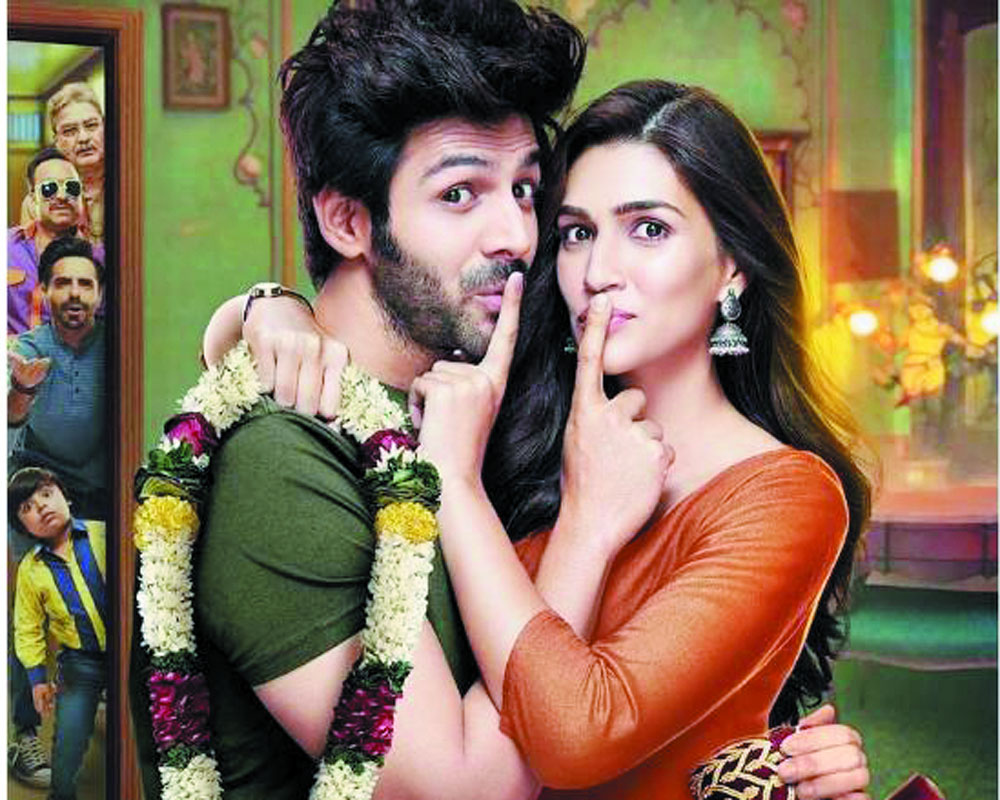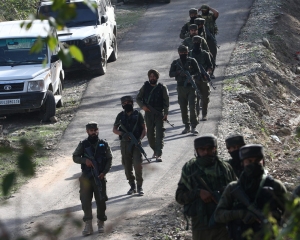Cinematographer turned filmmaker Laxman Utekar, who was a set sweeper, does everything with an intensity that has propelled him from the ground upwards, says Saimi Sattar
He sits quietly on the side and allows his actors, Kriti Sanon, Kartik Aryaan and Aparshakti Khurana to corner the spotlight completely. But Laxman Utekar, who makes his Hindi directorial debut with Luka Chuppi, which releases today, by his own admission is “more of an observer than a talker.” That’s because he has waited along the sidelines for far too long, being a sweeper on the sets. Then he held somebody’s camera, played with shots and the rest is cliched history.
This quality of being an onlooker has set the tone for his film set in Gwalior and Mathura, far-removed from his native Maharashtra. “The dialect is totally different as is the culture. For one and a half years, my writer and I visited the place often and stayed there at a stretch for 10 days to get the nuances right. We made friends, sat at the ghat, saw people, the lanes and the cows just ambling along. We came back at night and wrote the script. We even heard stories like the one about a couple who was unable to meet, given that it was a small town and did so at 4 in the morning in the public toilet,” he says. He believes that he has been able to incorporate the city’s atmosphere in it.
Luka Chuppi is the latest in the surfeit of films that are set in small towns and Utekar explains the reason. “Small cities are coming to the fore as cinema is changing. With producers like Dinesh Vijan, who are approachable for small town directors coming from places like Kanpur, Lucknow and other hinterland with stories that they have seen and lived, there is an element of realism. The audience appreciates these kind of stories.”
Moreover, the towns where these are set too become characters and reveal themselves to the widespread audience. “For the audience, New York, Australia, Africa, where movies were shot four to five years ago, were all the same, alien and disconnected. But in India, after every kilometre, the colours and the culture change. We discovered Chanderi in Stree and in Luka Chuppi we found Gwalior. People like being connected to their dialect, culture, places and colour,” says the director who you have to strain to hear as he is so soft-spoken.
Initially, besides Mathura, Agra was also a part of the film but it was Gwalior, lead actor Kartik Aryaan’s hometown, that they finally settled for. “I have worked as a cinematographer in Agra and I was not happy with it as besides the beautiful Taj Mahal, there is not much to the city. It wasn’t enough,” he recalls. So the crew decided to explore Gwalior as they had heard a lot about the place. It was love at first sight. “It is unique, clean and fresh and has the largest fort in India,” says Utekar.
The storyline of the film, which is evident from the promos, is about a couple’s decision to live in and their travails when their conventional families join them. Utekar decided to take up the topic as it has a resonance among the country’s youth. “If a couple wants to live-in even in a metro, it is difficult to rent a house. If they manage to do so, the neighbours cast aspersions and label them characterless. So in a smaller town it is even more difficult where the atmosphere is conservative. The film is a fun ride,” he says.
However, at another level he does feel that the country is changing. “Young India for me is smart India,” he says and gives the example of people in a mofussil town having access to web content from all over the world. He goes on to add, “People, having been exposed to a wide bouquet of subjects, can now gauge if the film works for them just by looking at the promo. They can differentiate between the good and bad. They appreciate a great plot. You can get any star for your project but if you give a bad product, it would not work.”
Talking of stars, not many might know that he has rubbed shoulders with some of the biggest names in the industry and says that he has learnt a lot from them. “When I was shooting with Amitabh Bachchan for 102 Not Out, I wondered if he was the same person whose films I’d watched as a child. He has the same energy, hunger and positivity at this age. One wants to be like that when one grows older,” he asserts.
But the list does not end there. He says there is a reason why Shahrukh Khan with whom he worked in Dear Zindagi is such a phenomenon. “It is not a fluke that he became one of the biggest superstars in India. The kind of decency and the knowledge that he has about any topic is unsurpassed. He is a director’s actor and a true gentleman. His co-star in the film Alia, even at this age, is a powerful performer but her feet are firmly planted on the ground. She knows she has the talent and how to use it,”
He also worked with Sridevi (English Vinglish) Irrfan Khan (Hindi Medium) as well as directors like Amit Sharma, Gauri Shinde and Umesh Shukla from whom he learnt the craft. “I have taken something from every actor or director as I observe a lot,” he says.
Incidentally he learnt his craft in that manner too. He has no qualms about admitting that he was a sweeper in a studio called Jain Brothers and rose through the ranks. “The camera attendant didn’t come in one day and the main camera attendant cribbed about the owner taking bookings in the absence of staff. So the owner Ashok Jain suggested that he should take me as I had finished my work for the day. I accompanied him. I always take up everything with an intensity. He liked my work and I gradually became second assistant, then first and so on,” says Utekar, who started his career as a cinematographer with the 2007 Hindi drama Khanna & Iyer. He has been a part of films like Blue, Boss and Tevar.
He made his directorial debut in 2014 with the Marathi movie Tapaal, which first screened at the 18th Busan International Film Festival 2013, South Korea, and opened to positive reviews and acclaim upon its release in India. His next directorial venture was yet another Marathi movie titled Lalbaugchi Rani, which chronicled the life of a mentally unstable girl who gets lost at Lalbaug during a Ganpati darshan and how she meets different people, changing their perspective towards life.
Beyond films, Utekar is a restless being. He says, “I cannot sit free at home. When I am not shooting, I might be writing or thinking about a story. If I am travelling, then I often wonder what is the relationship between two people from their body language, whether they are siblings or a couple.”
However, having done a lot, it is home that he likes going back to. “If I get a leave for three-four days, I go to my village Polatpur, near Mahabaleshwar, which is five hours away from Mumbai. My father and my joint family stay there. We have cows, goats, chickens. I like to plough fields, eat farm food and drink fresh milk. The atmosphere is different as there is no phone network. In metros, the phones do not let us live, even though humans do.” Clearly he inhabits the space between the small village and the megapolis with equal ease.
























